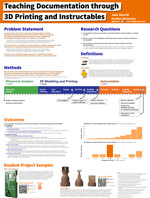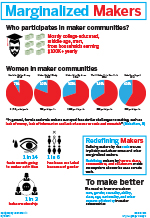Current Research
Having relocated to Doha, Qatar, in fall 2019, my research journey took an unexpected turn amid the challenges brought by the COVID-19 pandemic. The shift temporarily redirected my focus from face-to-face makerspaces to digital “maker” communities, and further towards artificial intelligence via the concept of “automated infrastructure,” a term co-developed with Michael Salvo. Additionally, I am analyzing Qatari students’ career paths within professional writing.
Now back in the United States, I am rekindling my work with maker communities while continuing to research AI’s impact on technical communication. The impact of my time in Doha continues to shape my research trajectory, with increased awareness of hospitality practices, community building, and cultural diversity.
Publications
Analyzing YouTube Content: Methodological Considerations for Technical Communication Research in Proceedings of the 41st ACM International Conference on Design of Communication (SIGDOC ’23).
Automated infrastructures: participation’s changing role in postindustrial work Communication Design Quarterly
A DIY Electronic Survey Device for Studying User Experience Kairos: A Journal of Rhetoric, Technology, and Pedagogy
Hiring, Training, Designing, and Hosting: A Case Study of an Inclusive Library Makerspace. In Re-Making the Library Makerspace Critical Theories, Reflections, and Practices, edited by Maggie Melo and Jennifer Nichols, Library Juice Press, 2020, pp. 265–82. Pre-print proof of chapter available here
Gender, technology, and narratives in DIY instructions. In Proceedings of the 35th ACM International Conference on the Design of Communication (SIGDOC ’17).
How 3D Printers Support Teaching in Engineering, Technology, and Beyond. Bulletin of the Association for Information Science and Technology 42(1).
Dissertation Abstract
My 2019 dissertation, “DIY Feminism in Post-Industrial Spaces,” situates makerspaces as an extension of post-industrial economies, and sites of technical communication and craftivism. I argue that hospitality and effective technical communication provide a foundation for building diverse, equitable, and inclusive makerspaces. To do so, I analyzed who participates in feminist makerspaces, how “makers” describe their work and their experiences, and the roles of rhetoric and technical communication within feminist makerspaces. My research used a mixed methods approach and an iterative methodology, including an online survey, two site studies at Midwestern makerspaces, interviews, and an on-site automated survey to collect user data via a DIY kiosk. I found that although people are becoming more familiar with makerspaces, surprisingly, regardless of gender and other aspects of identity, participants overwhelmingly described social anxieties about entering new spaces and unfamiliar communities as common barriers to entry—even before encountering issues based on gender, race, and other aspects of identity.
MA Thesis
My 2014 MA Thesis, “Makers: Technical Communication in Post-Industrial Participatory Communities” explores maker communities as fundamental to post-industrial economies, and is based on my experiences visiting three Scottish makerspaces, the Paris Maker Faire, and the Cincinnati Mini Maker Faire.
Selected Presentations
Conceptualizing Parametric Writing with AI: From Command Line to GUI (Presented at the Conference on College Composition and Communication 2023)
Mapping Storytelling on Etsy.com as Hyper-differentiation Strategy (Presented at SIGDOC 2022)
Teaching Documentation through 3D Printing and Instructables
(Awarded 3rd place in the SIGDOC Graduate Student Research Competition, 2016)

Marginalized Makers (Presented at the Cincinnati Mini Maker Faire 2016)

Do I Really Need Safety Glasses for This Class? (Presented remotely at CCCC 2017)
